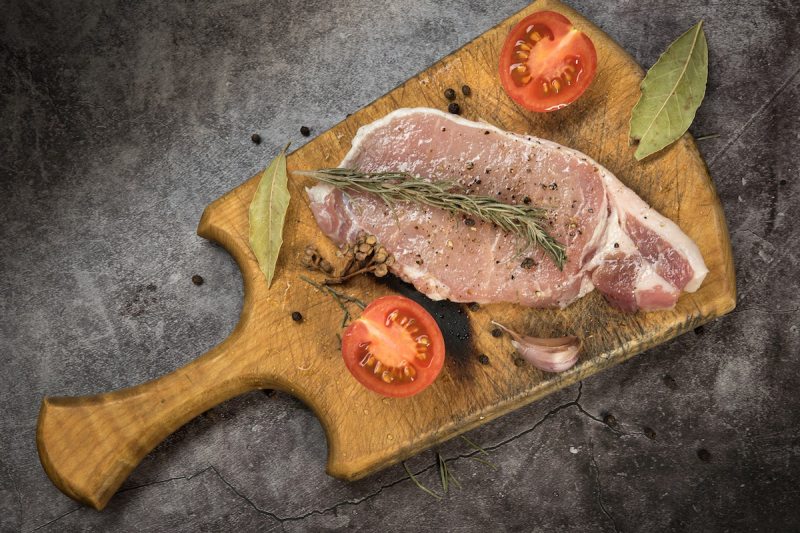For many of us, pork chops are a common comfort food. This American staple is versatile and has reached countless dinner tables. However, now that you’re pursuing healthier eating habits, the question of “Are pork chops healthy?” probably has come up. Also, what is the best way to prepare them for a healthier diet?
To help you decide whether pork chops should be included in your diet, we’ll examine their nutritional value and any benefits and downsides. Considering these factors and how to prepare them or make them healthier can give us a clear picture of how to make pork chops a healthy meal option for you.
What is the nutritional value of pork chops?

Looking at the nutritional profile of pork chops is a great place to start. Pork is an excellent source of several vitamins and minerals, which can benefit your health and wellness. You’ll find that a serving of pork chops can supply a good amount of vitamin D, as well as phosphorus and magnesium, which support skeletal health. Other essential nutrients provided by pork are zinc and selenium, which have immune-boosting properties. Pork chops also supply vitamin K, which has a role in blood clotting and bone health.
A four-ounce lean pork chop is packed with health-promoting nutrients. It has roughly 25 grams of protein, with only 144 calories and less than four grams of fat. This is a great way to get the previously mentioned vitamins and minerals in your diet, and pork chops are a great way to get B vitamins, like thiamin and niacin, and B6 and B12 in the system.
Are pork chops considered healthy?

Many people don’t realize that even though it turns white when it is cooked, pork is considered red meat, in the same category as meats like beef, so there’s often discussion about restricting these foods in the diet due to some common adverse effects associated with higher intake of red meats, like elevated blood pressure, weight gain, and cardiovascular diseases. However, pork chops may be considered healthy when eaten in moderation because this meat is stuffed with nutritional gems and is considered one of the leaner red meats. It has been suggested eating pork is associated with better nutrient intake among children and adults.
What are the benefits of eating pork chops?

Bone health
One benefit of eating pork chops is their vitamin D content. You’d be surprised, but just having one pork chop will provide 10% of the daily value of vitamin D. Interestingly, pork is one of the few foods that possesses vitamin D, as it’s not found in many foods organically.
Hormonal balance
Pork is also a good source of tryptophan. Feasting on a lean pork chop will allow you to take in 224% of the recommended dietary intake of tryptophan. Tryptophan is an essential amino acid that must be obtained in the diet. It is also a beneficial brain food used by the body to produce serotonin and melatonin, allowing for an improvement in your sleep and keeping your mood balanced.
Antioxidant properties
Another benefit to eating pork chops is their rich selenium content. Selenium is a vital mineral that you can only get from food. It is a major component in selenoproteins, making it integral for immune function and combat oxidative damage. Additionally, having pork chops will boost your selenium content by providing nearly 150% of the daily value and will enhance your overall health, from hair growth to muscle support.
Are there any downsides to pork chops?

Cardiovascular health concerns
As with most red meats, there is concern regarding the consumption of pork and increased cardiovascular disease risk. Pork chops can contain a significant amount of saturated fat and sodium, which can raise the risk of higher blood pressure, weight gain, and the development of cardiovascular diseases.
Liver health
Eating pork also raises concerns about liver health, as it has been associated with cirrhosis and liver cancer. A major part of this correlation is pork chops’ omega-6 fatty acid content, like linoleic acid. Additionally, N-nitroso compounds are found in pork cooked at high temperatures, which may also contribute to liver disease.
Improper cooking
One of the downsides to pork is the sensitivity in cooking preparations. You have to prepare it thoroughly and just right because undercooked pork can result in parasitic infections. However, if the pork is overcooked, it may contain carcinogenic substances.
How can you make pork chops healthier?

One way to enhance the health benefits of pork chops is to use herbs rather than relying on salt to add flavor as you prepare them. Also, try grilling or roasting your chops or baking them in the oven rather than frying. Another easy way to make pork chops a healthier meal option is to look for the leanest chops that you can find.
Increased lean pork consumption is correlated with decreased calorie, fat, and sodium intake. This also corresponds to greater dietary adherence to protein and potassium, as well as antioxidants like zinc and selenium, magnesium, and B vitamins.
Frequently asked questions

Are pork chops healthier than chicken?
Pork chops are not likely to be healthier than chicken due to the type of meat. Chicken is classified as poultry, while pork chops are red meat. Poultry is generally the healthier choice because of its greater protein content while containing less fat and fewer calories. However, choosing a lean pork chop may be more comparable to chicken.
Are pork chops healthier than steak?
Pork chops and steak are both classified as red meat, so one may not be healthier than the other. Both are filled with protein and nutrients, but there are some differences regarding content. Steak contains more iron and also has more fat content than pork. Alternatively, pork chops consist of more vitamins like vitamin D and thiamin.
How often should you eat pork chops?
You should probably eat pork chops in moderation and avoid having them more than twice weekly.




